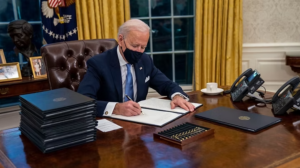The Legality of Executive Orders: Understanding the Autopen Controversy

The recent revelations regarding President Biden’s use of an autopen to sign executive orders raise compelling questions about the integrity and legality of these decrees. The oversight by the Oversight Project reveals a startling truth: many of the executive orders attributed to Biden were not personally signed by him but produced by a machine. This development casts doubt on the authenticity of these orders and highlights a potentially alarming issue for governance and executive power.
Are Autopen Signatures Valid?
One of the central questions to arise from the Oversight Project’s findings is whether an executive order is legally valid if not manually signed by the President. The concern is that if someone else is drafting these orders and merely feeding them into the autopen for a signature, it raises serious implications about accountability and the legitimacy of presidential authority. The implications stretch far beyond simple paperwork; they force us to consider the fundamental nature of executive power.
Traditionally, signing documents has been regarded as a personal act of authority and recognition. It’s not just a signature; it symbolizes that the individual agrees with the contents and consequences outlined therein. When mechanical assistance enters the fray, it’s not merely about convenience—it challenges the very essence of what it means to enact laws.
Understanding the Legal Framework
To navigate these complex questions, we should revisit some key legal principles. For example, the Electronic Signatures in Global and National Commerce (E-SIGN) Act of 2000 established the legality of electronic signatures. While the E-SIGN Act affirms that electronic contracts are valid as long as there is consent, it does not directly address scenarios involving autopens or automated signatures done without clear awareness from the signer.
In commercial practice, consent is usually evident—you engage with a document knowingly. But can we say the same about autopen signatures signed under questionable mental capacity or external influence? The intent behind a signature and the explicit consent required raises further questions about the legality of an autopen in a situation where the President’s capacity is in doubt.
A Historic Perspective on Signatures
The concept of signing documents is not new; it dates back millennia. Ancient civilizations used unique identifiers to signify agreement. Notably, the Hammurabi Legal Code established the need for clear contract law around 1650 B.C. Akkadian cylinder seals were one of the earliest forms of signatures, enabling individuals to authenticate contracts during the dawn of written communication.

Additionally, the Romans introduced signature rings, allowing individuals to endorse documents formally. However, unlike modern-day autopens, these signature mechanisms required the physical presence of the signer. The principle was clear: authenticity and intent were vital for validating agreements.
The Ethical Implications
What raises alarm now is the potential for executive orders issued through an autopen—especially those imposing significant penalties for violations. Can an authority genuinely delegate the power to enact laws and policies—potentially infringing upon citizens’ rights—without a physical, conscious act of signature? The short answer is a resounding NO.
By using auto-authorization methods, we risk diluting the executive branch’s responsibility to operate transparently and effectively. If the order bears a signature generated by a machine rather than a conscious action from the President, it goes against the values that underpin lawful governance.
Conclusion: A Call for Transparency and Accountability
At Extreme Investor Network, we believe in empowering our readers with critical information—especially as it pertains to governance and economic policies. The conversation around the legality of executive orders and autorization through machines goes beyond politics; it’s about ensuring that those in power act responsibly and ethically.
As these discussions develop, we encourage our readers to remain vigilant. Understanding the implications of digital signatures, especially concerning high-stakes decisions made by our leaders, is crucial to fostering an informed citizenry. The integrity of our democracy depends on transparency and accountability, and it starts by questioning practices that might compromise these ideals.
For more insightful analysis on governance, economics, and investment trends, continue following us at Extreme Investor Network. Together, we’ll explore not only the risks but also the opportunities that come from an informed perspective.

